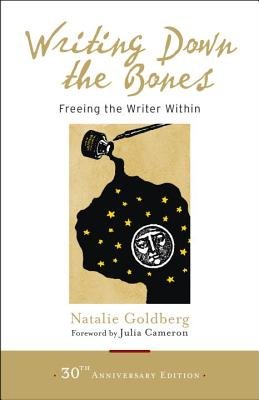5 books that will make you a better writer
Many people say that to get better at writing, you just need to write.
I think this is very silly. Imagine if we took that same philosophy with rocket science.
“All you need to do to build a rocket is sit down and build it!” Without picking up a physics textbook, or reading about previous discoveries, no one would ever build a rocket, much less one that can take people to the moon.
Other people have discovered wonderful things about the craft of writing. Take advantage of it! Learn from them!
Don’t reinvent the rocket ship. Grab these books to learn more about how writing works. You’ll be glad you did when your novel rockets up the bestseller list!
Writing Down the Bones
by Natalie Goldberg
I recommend this book like once a week irl, and it’s already been recommended on this blog.
I feel the need to keep pointing to it because I think it’s a big part of how I became a full-time writer.
Without the skills and lessons from this book, I don’t know if I would be here today. So I appreciate its wisdom and REALLY REALLY REALLY recommend it.
What I think is most impressive about the book is how it blends theory with practical advice.
You get some broad statements about writing that can help you build your own philosophy as an author, but you also get extremely helpful exercises that you can do every day to see immediate improvements.
Even if you ignore the rest of this list, get this book! (But don’t ignore the rest of this list, it’s all good stuff.)
How to Read Literature Like a Professor
by Thomas C. Foster
I first read this book in high school, and it not only set me up to nail English 101, but it also taught me the importance of symbols, theme, and a lot of other important parts of a book.
These are the things that may not be consciously apparent to you as a reader, but they influence everyone who reads.
With a greater awareness of the traditions of literature, you’ll understand your own writing in its context, and be able to craft more masterfully and purposefully.
One caveat with this book is that it primarily deals with the Western tradition, and mainly with English literature. Keep that in mind while reading it, especially if you want to write books that blend cultures! The things in this book aren’t laws, just important to be aware of if you write in English.
The Seven Basic Plots
by Christopher Booker
This book is kind of mind-blowing. It’s helped me understand film, literature, every story more deeply.
The author breaks down the majority of stories into seven basic plots (as you can imagine, based on the title), and then he goes a step further and explains these all in terms of a meta-plot, a greater, deeper plot for all of humanity.
Whether or not you agree with the theory isn’t really the point. The point is, this book is extremely helpful if you want to:
improve your story plotting
make protagonists people root for (even if they do bad things)
come up with satisfying endings
This book might seem intimidatingly long, but the first two parts are the most helpful. In the third part the author gets all “back when MEN were MEN and WOMEN were WOMEN” and it’s pretty annoying.
But you can just ignore that part and get lots of good learnin’ from the first two parts!
Steal Like an Artist
by Austin Kleon
Network Member Recommendation!
This book is a favorite among MakeGood Creative Network members, helping everyone from visual artists to actors to writers and more.
It’s subtitled “10 Things Nobody Told You About Being Creative” because some of the advice goes against the grain or feels counterintuitive.
But when it comes to being an artist in today’s world, this book gets it, and will help you overcome insecurities and confusions that might plague you when starting out.
It’s also a quick, fun read, so if you don’t feel like diving into some of the heftier works listed above, this is a great place to start!
How Fiction Works
by James Wood
Network Member recommendation!
This book was recommended by David Pischke, an english teacher, publisher, and author (so he knows a thing or two about this!).
In this book, a literary critic breaks down how all the elements of a book work, as well as giving a history of the novel.
This is like a crash course in How to Make Books, and it will give you a much greater mastery of your craft, as well as understanding of where your writing fits in the greater tradition of human literature.
As you can imagine with an ambitious title like that, this book covers a lot of ground. It’s probably not the best place to start if you’re new to the craft, but if you’re fairly experienced and looking to improve, grab this book.
Need more help getting creative?
Stuck in writer’s block?
Not confident enough to get going?
Not even sure WHAT your problem is, but know you’re not writing as much as you’d like?
We have a guide for that! It’s called the 21 Creativity Killers (and how to beat them).
This guide will help you:
Diagnose what’s keeping you down.
Plan your counterattack.
Take simple steps to feel better and create more than ever!
Grab your instant download here: https://www.makegoodcreativenetwork.com/21-creativity-killers





